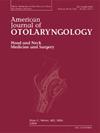Treatment effects of combined transcranial direct current stimulation and counseling for the treatment of chronic tinnitus
IF 1.7
4区 医学
Q2 OTORHINOLARYNGOLOGY
引用次数: 0
Abstract
Aims
We aimed to evaluate the comparative efficacy of three treatment modalities for chronic tinnitus: TRT-based directive counseling, transcranial direct current stimulation (tDCS), and their combination. Primary endpoints were changes in tinnitus severity and psychological distress; secondary endpoints included treatment response rates and anxiety reduction.
Methods
Forty-one patients with chronic tinnitus lasting 3 months or more of duration were enrolled who were treated at a tertiary hospital between November 2021 and December 2023. Patients were allocated to counseling (n = 11), tDCS (n = 19), or combined therapy (n = 11) based on informed preference. Treatment outcomes were assessed using the Tinnitus Handicap Inventory (THI), Visual Analog Scale (VAS), Beck's Depression Inventory (BDI), and Hospital Anxiety-Depression Scale (HADS). Statistical analysis included Wilcoxon Signed-Rank tests for within-group comparisons and Kruskal-Wallis tests for between-group analyses.
Results
Clinically significant improvement (THI reduction ≥7 points) was achieved in 70.7 % of patients overall: 63.6 % in counseling, 73.7 % in tDCS, and 72.7 % in combined therapy groups. Mean THI scores decreased significantly from 54.3 ± 22.8 to 37.7 ± 19.7 (p < 0.01). The combined therapy group showed superior anxiety reduction (HAD-A, p = 0.034) compared to single modalities. Both tDCS and combined therapy demonstrated greater improvements in multiple psychological measures compared to counseling alone.
Conclusion
Combined tDCS and counseling therapy shows enhanced efficacy in managing chronic tinnitus, particularly for patients with concurrent anxiety symptoms. This multimodal approach may provide a more comprehensive treatment strategy than single modalities alone. Future randomized controlled trials are needed to confirm these findings and establish optimal treatment protocols.
经颅直流电刺激联合心理咨询治疗慢性耳鸣的疗效观察
目的:我们旨在评估三种治疗慢性耳鸣的方式:基于trt的指导性咨询、经颅直流电刺激(tDCS)及其联合治疗的比较疗效。主要终点是耳鸣严重程度和心理困扰的变化;次要终点包括治疗反应率和焦虑减少。方法选取2021年11月至2023年12月在某三级医院接受治疗的41例持续3个月及以上的慢性耳鸣患者。根据知情偏好,患者被分配到咨询(n = 11)、tDCS (n = 19)或联合治疗(n = 11)。采用耳鸣障碍量表(THI)、视觉模拟量表(VAS)、贝克抑郁量表(BDI)和医院焦虑抑郁量表(HADS)评估治疗结果。统计分析包括组内比较的Wilcoxon Signed-Rank检验和组间分析的Kruskal-Wallis检验。结果70.7%的患者临床显著改善(THI降低≥7点):咨询组63.6%,tDCS组73.7%,联合治疗组72.7%。THI平均评分由54.3±22.8降至37.7±19.7 (p <;0.01)。与单一治疗方式相比,联合治疗组表现出更好的焦虑减轻(HAD-A, p = 0.034)。与单独咨询相比,tDCS和联合治疗在多种心理测量方面都显示出更大的改善。结论tDCS联合咨询治疗对慢性耳鸣有较好的治疗效果,尤其是对伴有焦虑症状的患者。这种多模式的方法可能提供比单一模式更全面的治疗策略。需要未来的随机对照试验来证实这些发现并建立最佳治疗方案。
本文章由计算机程序翻译,如有差异,请以英文原文为准。
求助全文
约1分钟内获得全文
求助全文
来源期刊

American Journal of Otolaryngology
医学-耳鼻喉科学
CiteScore
4.40
自引率
4.00%
发文量
378
审稿时长
41 days
期刊介绍:
Be fully informed about developments in otology, neurotology, audiology, rhinology, allergy, laryngology, speech science, bronchoesophagology, facial plastic surgery, and head and neck surgery. Featured sections include original contributions, grand rounds, current reviews, case reports and socioeconomics.
 求助内容:
求助内容: 应助结果提醒方式:
应助结果提醒方式:


